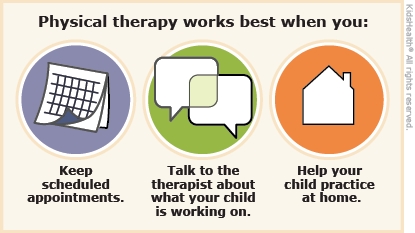Physical therapy (PT) uses movements and exercises to help people:
The physical therapy is done by a physical therapist (a health care provider with special training on how the body moves and works). Here's how to help your child get the most out of physical therapy.


Keep scheduled visits with the physical therapist. The physical therapist will work with your child and give them exercises to do at home or in school. They might work with your child one-on-one or in a small group. Sometimes, the physical therapist may suggest that your child get other types of services, such as seeing a medical specialist or getting physical therapy through their school.
Talk to the therapist about what your child is working on. Physical therapists use a variety of strategies, such as:
Help your child practice at home. The exercises your physical therapist gives your child to practice at home are an important part of helping your child. Be sure you understand all the instructions and can help your child do the exercises as directed.
Be patient with your child. Improving movement and strength can take time and effort. Support from family members is important. Celebrate progress, even if it's slow.


What can I expect at my first appointment? At the first visit, the physical therapist will ask questions about your child's injury or condition and how it affects their movement and daily life. Then the physical therapist will create a plan for your child's needs.
How long will my child need physical therapy? It depends on why your child is getting physical therapy and whether they follow the treatment plan. Some children need physical therapy only for a short time, while others may need it for many months or even years. Ask your physical therapist what to expect based on your child's progress.